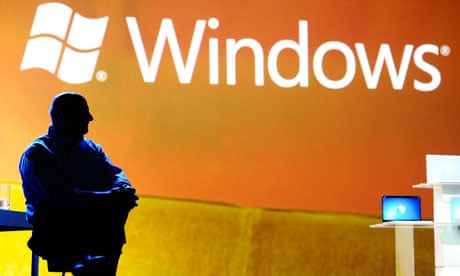In an April press release, IDC painted a bleak picture for the PC. Compared with last year's first quarter, worldwide shipments of PCs are down 13.9%, the "steepest decline ever in a single quarter". US numbers are about the same: -12.7%. On a graph, the trend is unmistakable:
Is this a trend Wall Street likes?
When you consider Microsoft, it seems so. In a corporate blogpost titled Windows 8 at Six Months, the company proudly claims to have "recently surpassed the 100m licences sold mark for Windows 8." This is an interesting number. A quarter ago, MS announced it had sold 60 million licenses, meaning that only 40m were sold in the last three months. That's a 33% drop … hardly a rousing success. (The "licences sold" phrase requires caution – it doesn't only mean "sold with new PCs", there are also updates to existing machines, with or without enthusiasm for the new Windows OS.)
"Ignore the Windows 8 numbers and IDC analysis", says Wall Street. While the tech-heavy Nasdaq climbed only 6.6% in the past 60 days, Microsoft shares went up by 21%.
The same apparent lack of logic holds for Hewlett-Packard. Last week, the largest PC maker disclosed its second quarter numbers. Compared with the same quarter last year, they're not exactly pretty:
Revenue down by 10% to $27.6bn
Operating margin at 5.8%, down by about 20% (HP prefers "down 1.4 points")
EPS (earnings per share) at $0.55, down 31%
Zeroing on HP's PC business, things look worse:
Revenue down by 20% to $7.6bn
Operating margin at 3.2%, down 44% ("down 2.2 points" sounds better)
As one would expect, Wall Street reacted, and HP shares went … up. By 17.8% the day after the announcement:
What was the good news for investors? Resorting to one of the usual bromides, HP "handily beat Street expectations" by posting earnings per share (EPS) of $0.55 vs a projected $0.30 to $0.40.
As discussed in the December 16th Monday Note, Chapter 2 of the Turnaround Artist Manual prescribes exactly what we're seeing: Drastically lower expectations within days of taking on the job. "Things are worse than I was told. We'll have to touch bottom before we bounce back…'"
Following the script, HP CEO Meg Whitman called 2013 a "fix and rebuild year". Everyone should expect a "broad-based profit decline". But a 17% rebound in the stock price can't be explained solely by a collective sigh of relief when the actual numbers aren't as bad as the CEO had led everyone to expect.
(In its earnings release, HP still calls itself "The world's largest technology company". I guess they think smartphones and tablets aren't "technology", but PCs and printers are …)
As quoted in a VentureBeat post, Whitman thinks that the other US PC maker, Dell, is in no better shape:
"You saw a competitor, Dell, completely crater earnings," Whitman said in response to a question. "Maybe that is what you do when you are going private. We are setting up the company for the long term."
Ironically, and without a hint of self-awareness, she accuses Dell of playing the "setting artificially low expectations" game:
She implied that Dell did that on purpose, since Michael Dell is motivated to repurchase shares in the company as cheaply as possible, and deliberately lowering earnings is a good way to get the share prices to fall.
Actually, Whitman must envy what Dell is attempting to do: get out of the PC clone race to the bottom. Because PCs make half of Dell's revenue, getting out of that hopelessly commoditised business would cause trouble if done in public. Going private allows Dell to close the curtain, perform the unappetising surgery out of view and, later, return to Wall Street with a smaller company endowed with a more robust earnings engine, focused on higher-enterprise gear and services.
This helps explain the apparent paradox: Wall Street doesn't like HP and Microsoft shares despite their lower PC numbers but because of them. Investors want to believe that future earnings (the ones they count on when buying shares today) will come from "Post-PC" products and services instead of being weighed down by shrinking PC volumes and margins. In particular, those who buy HP shares must believe that the company will sooner or later exit the PC clone business. For Microsoft, the bet is that the company will artfully manage a smooth transition to higher Enterprise and Entertainment revenues and their fatter margins.
I'm not in fond of the "Post-PC" label, it lacks nuance and it's premature. The desktop and laptop machines we've known for more than three decades may no longer be the sole incarnations of our personal computing – our affection, time, and money have shifted smartphones and tablets – but the PC will continue to live in our offices and homes.
Regard Lenovo, the Chinese company that seized on IBM's PC business when Big Blue decided to exit the race. They're doing quite well, posting a record $34bn in revenue for this year.
There is life left in the PC business, just not for US incumbents.
